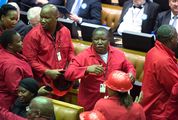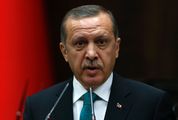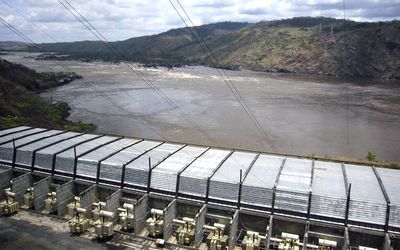MPs on Tuesday questioned the country’s substantial investment in the Grand Inga hydroelectric scheme, citing political instability in the Democratic Republic of Congo (DRC).
SA is poised to pump more than R64bn into the ambitious scheme to transmit about 2,500MW from the DRC to a power station in Limpopo.
The plan is for the DRC to build the generating plant on the Congo River and for SA to build a 4,000km transmission line to bring the power into the country.
Briefing Parliament’s energy committee on Tuesday, the deputy director-general for policy and planning at the Department of Energy, Ompi Aphane, said the selection of a concessionaire for the construction of the project was expected to be concluded by the end of this year.
It was envisaged that the contract would be concluded by the end of 2017 and the scheme come on line by 2023.
Mr Aphane explained that the framework treaty, signed in 2014 between SA and the DRC, committed SA to buy power generated at Inga.
This obliged SA to purchase 2,500MW and to provide assistance in mobilising funding for the project, he said.
The DRC has granted SA a right of first refusal which guarantees SA 20% of the power generated.
"It is anticipated that the economics of the project will be more favourable as more phases are added and the generation cost per megawatt will decline," said Mr Aphane.
It was also provided that SA will be charged the lowest possible tariff and that no other buyer of Inga power can receive better terms.
Inkatha Freedom Party MP Jan Esterhuizen said the DRC was one of the most unstable countries in Africa and was notorious as a place to do business. The transmission route from the DRC would also traverse other unstable countries such as Zambia and Zimbabwe.
"Is there an escape clause for South Africa because it looks as if it won’t happen?" Mr Esterhuizen asked.
African National Congress MP Tandi Mahambehlala also expressed concern about political stability in the DRC and asked: "Did the feasibility study look at political instability?"
Mr Aphane said the question of political risk was taken care of in the initial treaty.
Democratic Alliance MP Pieter van Dalen said about 5% of any power transmitted was lost every 1,000km and asked: "Will we lose 20% of the power we buy, or will the 2,500MW be what arrives in South Africa?"
Mr Aphane acknowledged that there would be losses during transmission and that the 2,500MW would be the power arriving at the delivery point on the border between the DRC and Zambia.





















Change: 1.19%
Change: 1.36%
Change: 2.19%
Change: 1.49%
Change: -0.77%
Data supplied by Profile Data
Change: -0.19%
Change: 0.62%
Change: 1.19%
Change: 0.00%
Change: 0.34%
Data supplied by Profile Data
Change: 0.63%
Change: 0.55%
Change: 0.17%
Change: 0.44%
Change: 0.00%
Data supplied by Profile Data
Change: -0.39%
Change: -1.53%
Change: -0.63%
Change: -0.51%
Change: -0.12%
Data supplied by Profile Data